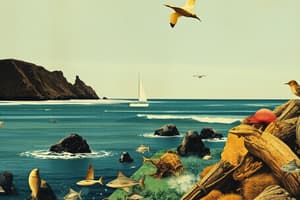Podcast
Questions and Answers
Which type of ecosystems are mainly located in coastal areas and in the open ocean?
Which type of ecosystems are mainly located in coastal areas and in the open ocean?
- Urban ecosystems
- Forest ecosystems
- Marine ecosystems (correct)
- Desert ecosystems
What do coastal wetlands provide habitat and nesting areas for?
What do coastal wetlands provide habitat and nesting areas for?
- Mammals only
- Fish and wildlife (correct)
- Birds only
- Insects only
What is an estuary?
What is an estuary?
- A region with extreme cold temperatures
- A type of desert ecosystem
- A high mountain ecosystem
- An area where fresh water from a river mixes with salt water from the ocean (correct)
Why are estuaries considered very productive ecosystems?
Why are estuaries considered very productive ecosystems?
What is a common function of coastal wetlands other than providing habitat for wildlife?
What is a common function of coastal wetlands other than providing habitat for wildlife?
Which characteristic makes marine ecosystems different from freshwater ecosystems?
Which characteristic makes marine ecosystems different from freshwater ecosystems?
Why are estuaries among the most productive ecosystems?
Why are estuaries among the most productive ecosystems?
What is a major threat to coral reefs?
What is a major threat to coral reefs?
How do wetlands contribute to the environment?
How do wetlands contribute to the environment?
Which ecosystem provides habitat for approximately one-fourth of all marine organisms?
Which ecosystem provides habitat for approximately one-fourth of all marine organisms?
How can understanding our impact on aquatic ecosystems help?
How can understanding our impact on aquatic ecosystems help?
What makes marine ecosystems different from freshwater ecosystems?
What makes marine ecosystems different from freshwater ecosystems?
What is the main reason wetlands are important to fisheries in the United States?
What is the main reason wetlands are important to fisheries in the United States?
Why are animals that live in estuaries adapted to varying levels of salinity?
Why are animals that live in estuaries adapted to varying levels of salinity?
What causes eutrophication in lakes with large amounts of plant nutrients?
What causes eutrophication in lakes with large amounts of plant nutrients?
Why are Arctic ecosystems considered marine ecosystems?
Why are Arctic ecosystems considered marine ecosystems?
Which statement does not describe a function of wetlands?
Which statement does not describe a function of wetlands?
Why do animals living in estuaries need to be adapted to varying salinity levels?
Why do animals living in estuaries need to be adapted to varying salinity levels?
Flashcards are hidden until you start studying
Study Notes
Marine Ecosystems
- Marine ecosystems consist of a diverse range of plant and animal communities, located mainly in coastal areas and the open ocean.
- Organisms in coastal areas adapt to changes in water level and salinity, while those in the open ocean adapt to changes in temperature and availability of sunlight and nutrients.
Coastal Wetlands
- Coastal wetlands are areas covered by salt water for all or part of the time, providing habitat and nesting areas for many fish and wildlife.
- They absorb excess rain, protecting areas from flooding, and filter out pollutants and sediments.
- They also provide recreational areas for boating, fishing, and hunting.
Estuaries
- Estuaries are areas where fresh water from a river mixes with salt water from the ocean, forming a nutrient-rich environment.
- They are very productive ecosystems due to the constant supply of fresh nutrients from the river and ocean.
- Estuaries provide habitat for a multitude of plants and animals, trap and filter sediments and pollutants, reduce flood likelihood, and buffer shorelines against erosion.
Other Marine Ecosystems
- Coral reefs are susceptible to destruction due to their requirement for tropical temperatures and high sunlight levels.
- They provide habitat for approximately one-fourth of all marine organisms.
- Marine ecosystems also include salt marshes, mangrove swamps, barrier islands, and polar ecosystems.
Human Impact on Aquatic Ecosystems
- Almost every person has an impact on aquatic ecosystems, and understanding this impact can help reduce negative effects.
Wetlands and Fisheries
- Wetlands are important to fisheries in the United States because many fish caught each year use wetlands for feeding and spawning.
Estuaries and Animals
- Animals that live in estuaries must be adapted to varying levels of salinity.
Eutrophication
- Bacteria cause eutrophication in lakes containing large amounts of plant nutrients by reducing oxygen dissolved in the water and feeding on decaying plants and animals.
Arctic Ecosystems
- Arctic ecosystems are considered marine ecosystems because phytoplankton form the basis of arctic food webs.
Studying That Suits You
Use AI to generate personalized quizzes and flashcards to suit your learning preferences.




